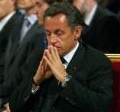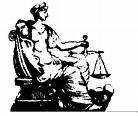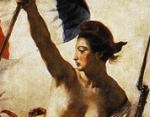 Our French President has recently drawn criticism after one of his speeches during his visit to the Vatican.
Our French President has recently drawn criticism after one of his speeches during his visit to the Vatican.
In front of the highest Roman Catholic Clergy, he emphasized the importance of the French "christian roots" (mainly Catholic), while he also pleaded for a "positive" version of "laïcité" (laicity, sometimes translated by secularism).
But many French (including myself) thought that Nicolas Sarkozy went a bit too far.
OK to aknowledge the importance of Faith, OK to highlight of the great French catholic heritage... But France today is multicultural, multireligious.... and mostly secular.
Why this Godtalk then ? Why did he deeply emphasized the French great Catholic root, without a word for the heavy heritage of Catholic discrimination and persecution against Protestants, Jews, and Free-thinkers before 1789 (French Revolution)?
And why did Nicolas Sarkozy completely forget the Enlightenment heritage as well?
The US way to cement the social, religious and cultural diversity is Civil Religion. The French way is "Laïcité". Many French believe that laïcité (laicity) might be fragilized if Nicolas Sarkozy remains on his current line.
But what do the French mean by that? Here are a few words of explanation.
 What is "laïcité" (laicity) ?
What is "laïcité" (laicity) ?
Almost all French citizens believe today that the further the State is from religions, the better off it is. This idea was not widely accepted around 1905, when the Churches were seperated from the State.
But since then, this principle of separation has won the hearts and minds, around the notion of laïcité (laicity), a key word to understand today's French mindset, and the reasons why many did not particularly like Sarkozy's recent speech in Vatican.
The French are very proud of this concept of laicity (wrongly translated by secularism) and they like to think of it as their property (however other countries also practice it).
What does ”Laïcité” mean ?
Laicity implies that the State holds a neutral position in religious matters and offers no support to any religion in particular. Well, this is far from revolutionary isn't it? This principle was practiced in the US more than one century before its lasting introduction in France. But there is more. This principle of laicity also means that all religions are equal before the law.
Freedom of conscience and religion must be total with respect to the rights of individuals. Once again, this is far from specific to France. So let's move further.
Freedom of conscience and freedom of thought
According to many specialists (like Jean Baubérot or Claude Nicolet), laicity also attempts to conciliate “freedom of conscience” (everyone has the right to believe what he chooses) and “freedom of thought”. This is extremely important.
What does this “freedom of thought” mean exactly? It means that the State, through its’ public schools, intends to foster emancipation by giving each citizen the opportunity to learn to think freely without being locked in the ideas of his native social group. Public school must allow each individual to be confronted to different systems of thought, different cultural references so that he can make choices more freely.
In some ways this “freedom of thought” scares the American public because it seems to give the State too much importance. Big Brother'shadow? In the US tradition, freedom of conscience is more emphasized than freedom of thought.
But in France, although freedom of conscience is important, freedom of thought is essential. This must be understood within a specific historical context.
 The State as an emancipator
The State as an emancipator
The emphasis on “freedom of thought” can be explained by the fact that France, unlike the United States, was submitted for a very long time to the religious and cultural monopoly of the Catholic Church, the bulwark of the monarchy.
When the Republic settled into place durably, it had to fight hard this Catholic monopoly and educate the population to pluralism and a new democratic culture. Thus, the modern Republican State chose to take on the role of an emancipator, helping citizen to widen their views.
Since then, most of the French believe that religious views are on the side of particularism, while Republican "laïcité" (laicity) is on the side of universality.
Which explains why Nicolas Sarkozy's speech in Vatican did not meet strong approvals in our secular country, proud of its laicity.
Comments
I've just found this English-language version of your French blog. Explaining laïcité and religion in France to outsiders is not easy, and not all readers believe it anyway (if my reporting experience in Paris and my blog FaithWorld -- http://blogs.reuters.com/faithworld/ -- are anything to go by). So welcome to the anglophone blogosphere and best of luck trying to convince them!
Thank you Tom for your encouragements!
And thanks for the link as well. A great resource I'll be glad to use.
There's a challenge indeed: let's see if French "laicité" can be translated in our Global Village as easily as Asterix has been translated into more than 100 languages.
Many french may have thought that Sarkozy went too far, but many french also took his talk as a positive one for religions in France - I include myself, a french protestant !
Bjr :) merci pojur ce billet fort intéressant :) il y za cependant quelques points obscuurs : "everyone has the right to believe what he chooses" ... qu'entends tu pra là ? bonne continuatio :)
PS - this blog is a great idea!
I agree that France today is multicultural, multireligious. And public school must allow each individual to be confronted to different systems of thought, different cultural references so that he can make choices more freely. Thanks for the post.
Thank you very much for your article. Did he go far or not in this situation? I think he had raisons to say like that. You see your historical information reflects the essence of this question. What is "laïcité" (laicity)? It is a question which is still being discussed.
It seems to me that now French people and all around try to find something witch can put him in an awkward position. I think they were able to do this. As for me I took this talk as a positive and I don't see any provocation.
What does this “freedom of thought” mean exactly? Freedom for me is the important thing in my life. thx for so interesting article...
Avez-vous eu l'occasion de lire René Girard. Il m'a beaucoup aidé a poser le problème de la laïcité. Bonne continuation.
merci pour les details.L'article est tres interessant.
Thank you for these explanations. The French are not always clear about what "laïcité" is. Your paper helps me a bit. Thanks.
Great blog, just looking around some blogs, seems a pretty nice platform you are using. I'm currently using Wordpress for a few of my sites but looking to change one of them over to a platform similar to yours as a trial run.
Why don't you publish something about it
When do you post another note about this?
We need explanations from people like you.
The French are so complicated when it's about religion!
Je ne suis pas athée. Mais je suis d'accord avec l'idée que la sécularisation ne doit pas être inversée. Il est une question spirituelle, et il est laïque. Il ne faut pas mélanger religion et politique. Donc, je ne suis pas d'accord avec Sarkozy.
Hi. I wanted to drop you a quick note to express my thanks. I have been following your blog for a month or so and have picked up a heap of good information as well as enjoyed the way you’ve
Merci, thank you, this is useful for me.
Inspiring, clear, useful, merci
Well, did not get everything. Go back to it with pore plz
La laïcité, compte tenu de notre constitution et notre système législatif (monarchie laïque républicaine) est un concept qui se retrouve sans socle de valeurs de vie fondamentales immuables (bateau sans voile). Les valeurs de ce socle sont issues au tout début, qu'on le veuille ou non, des valeurs judéo-chrétienne. Elles se retrouvent suite à notre République post-1789 modifiables à l'Assemblée Nationale à tout moment par les différents mouvements politiques successifs mises en places par des groupes de pressions divers qui ont basés leurs existences et créés leurs socles de valeurs sur un point commun "Argent = Pouvoir". Ce système est en opposition total avec la chrétienté... Il est donc logique aujourd'hui de voir l’Assemblée Nationale acceptée de nouvelles lois comme par exemple « Le mariage homosexuel ». Nous pouvons parier que dans les deux ans qui viennent la PMA et la GPA seront autorisés (achat et vente d’enfants, nouvel esclavage). L'Être humain est de nature faible. Sans repère et socle de valeurs immuables, il redeviendra un «sauvage ». Donnez-lui « le peuple » du pain, des jeux, du vin et du sexe en prime et vous récolterez un peuple malléable à souhait décadent. C'est exactement ce qui se passe en France actuellement. Nous sommes au milieu du processus... Ce processus est en plein accélération en France grâce aux médias entièrement au service du pouvoir, au GX et à l'OMC. (La France s’est créée un nouveau veau d’Or : La Laïcité). Le réveil sera bien évidement violent. Souhaitons que nos élus comprennent avant qu’il ne soit trop tard, qu’il est urgent de réagir et d’inscrire dans la constitution des valeurs universelles non modifiable. Il n’est pire aveugle que celui qui ne veut pas voir…